This column launched five years ago when I traded my bitsa-bike (frankenbike) KLR650 for an abused 1986 GSX-R1100. The plan for this 1100 was this: Build it into a nice motorcycle in the confines of my own garage, or at least in the world of Southern Colorado. Due to the decrepitude of this GSX-R, I felt confident that even my plebeian efforts could produce something better than what I brought home. “Well. You can’t make it any worse,” my brother Bill reflected.
I had an extremely fun winter as the battered ex-racing Suzuki took shape, learning a lot while building a bike I could not afford as a cub reporter back in ’86. Refurbishing the stock components took plenty of elbow grease followed by spraying of paint in the can.
The stock bodywork was what you’d expect from a neglected 30-year-old sportbike, but I was lucky enough to have a set of 1986 GSX-R750 Limited Edition bodywork in boxes; they were rough but roadworthy. That was the finishing touch for the ’86 and I boxed up the stock and beaten bodywork and rode the bike around Colorado.
The problems with the LTD bodywork on this beater were twofold: First, the bodywork was worth more than the bike! Second, the LTD’s solo-seat tailsection didn’t allow me to carry anything via bungee strap or my handy-dandy tail bag. And any backpack or tank bag threatened to scratch the fragile paint.
“You’ve taken a $1,000 bike and made it too precious to ride,” my brother said laughing. He spoke the truth. He helped me unbolt the Limited bodywork and reattach the stock stuff; we plastic-welded what could be saved and hacksawed what was beyond repair.
Fast-forward a few years and I spotted YCRS instructor Michael Henao in the Pueblo Motorsports Park paddock, campaigning his BMW S 1000 RR. His RR was way too pretty to be a racebike and as I examined it, he told me the graphics were a quick-and-dirty wrap by his buddy Sean Hamlin. “What’s his number?” was my next question because I saw a solution for my budget project GSX-R.
I caught Hamlin in the middle of a significant and exciting job transition because Elite Motor Cars in Concord, California, had hired him to be their director of operations and he was packing himself up and out of Denver. But he had time to knock out my project. We picked colors out of his Avery wrap book, and I left him the bike after discussing the old-school heritage of the GSX-R. Luckily Hamlin grew up riding and racing dirt bikes before Henau hooked him on pavement racing with ChampMini, leading him to trackdays and roadracing. In other words, I trusted this motorcyclist with the design. Anything was going to look better than the rattle-can white primer.
Sean began as a painter and has gone exclusively to wraps. “The custom possibilities are higher with vinyl; it’s less expensive and not permanent,” Sean began. “Vehicles can depreciate when you repaint them, but with wrap you can completely change the color, go from mild to wild, and just peel it off to reveal the stock paint.
“Your bike is a perfect example to wrap. It’s nice but not worth a ton of money. Dropping $3,000 to $5,000 on a paint job may not be the smartest move on this 1100.
“Riders who buy new bikes but want to stand out in the crowd love wraps, because you often get better resale when the paint is returned to stock; otherwise you’re hoping the buyer likes your taste. Racebikes are a category where wrapping stock or aftermarket bodywork makes sense…and I mean dirt or asphalt racing bikes. I’ve wrapped a lot of dirt bikes.”
Hamlin’s background revolves around cars and he’s a turbocharging nut, so right away we like him. The highlights of his personal garage are two heavily modified boosted cars: a 996 Turbo Porsche and an over-the-top Jeep Trackhawk; the day I met him he was turbocharging an older Camaro. I mention this because I’ve always gotten better work from enthusiasts—they understand our passion. Elite hired him because of his car-customizing background, and his main strengths are coordinating big projects and wrapping supercars—half-million-dollar supercars. No matter what your project, Hamlin and Elite will wrap it.
“Bikes are a different animal in terms of complexity of installation,” Sean continued. “You’ve got tank shapes, multi-layer fairings—lots of possible failure points (edges). On bike wraps, you’ve got to slow down and take your time. I really enjoy the challenge.”
This wrap is in the $1,500 neighborhood and took about a week. It would have been less, and quicker, if the paint Sean started with was better. He had to put some prep time into the primer and Bondo I had inexpertly applied—surprised? Sean cautioned that each bike wrap is different in terms of cost and time due to the complexity or simplicity of not just the wrap design, but the bike’s layout.
The wrap has changed the bike completely. It was beautiful in the LTD bodywork, clean and relatively neat in the stock primered bodywork, but now looks finished and complete and custom in Sean’s vinyl. Before the wrap I felt the primered GSX-R was cool, kinda tough, and hot-roddy, but now I see the pre-wrap bike as unfinished and wanting.
Sean’s wrap matches the work I did in my garage: It’s straightforward and old-school. The GSX-R1100 never pretended to be anything other than a sledgehammer and, in my opinion, this wrap works well with that image. And if I didn’t like it, we could unwrap it and start again.
“There’s a traditional five-year warranty on the vinyl, and I use Avery,” Sean explained. “If you live in the Arizona desert and park your bike outside uncovered, you probably won’t get five years out of one wrap. Conversely, if you have a show bike that lives inside, the vinyl will last practically forever.”
I worked for Motorcyclist magazine when the GSX-R1100 was introduced and to have a rideable example has been fun, but Sean’s wrap has added pride of ownership to that riding joy. It’s a bigger deal than I suspected. I’ve discovered that my personality is less “primer and beater” than it is “shiny finish”; I like the wrapped bike that much more. It’s also fun to think I can change the look in a few years with relatively small costs involved.
Sean Hamlin provided an affordable way to finish this DIY project; my first experience with vinyl wrap has encouraged me to try it again while recommending it to you.
More next Tuesday!










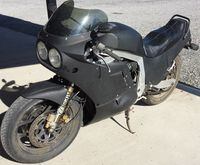
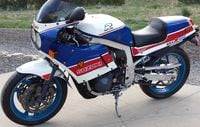

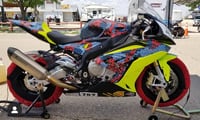

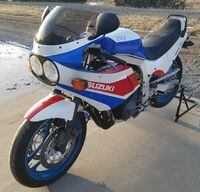

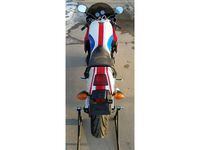
/cloudfront-us-east-1.images.arcpublishing.com/octane/4CMH3FI73BEM5D6MFYX42FLDSQ.jpg)
/cloudfront-us-east-1.images.arcpublishing.com/octane/RIHAPYNWU5H3XAOXNOPRWCBTQA.jpg)
/cloudfront-us-east-1.images.arcpublishing.com/octane/HU4NUBCL3VAFZA75VYRCMAUHVM.jpg)
/cloudfront-us-east-1.images.arcpublishing.com/octane/OB43AZK7TRA6XLZL5WRDVW2TDA.jpg)
/cloudfront-us-east-1.images.arcpublishing.com/octane/5G44Y3FXWNFSTEQKCA355PXOPU.jpg)
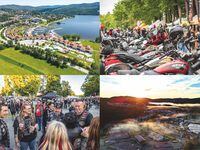
/cloudfront-us-east-1.images.arcpublishing.com/octane/XRI4GTLCVBA5NESASCBIR5LYQI.jpg)
/cloudfront-us-east-1.images.arcpublishing.com/octane/EF7566PXARGMBAOMLWTECYL3LE.jpg)



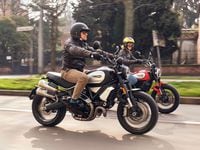
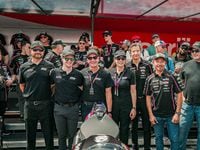
/cloudfront-us-east-1.images.arcpublishing.com/octane/3LASNXSWUZFFPISURDJF3OCWBU.jpg)
/cloudfront-us-east-1.images.arcpublishing.com/octane/2BHJKWUTBNBTLMQCKDNVEG6DKQ.jpg)
/cloudfront-us-east-1.images.arcpublishing.com/octane/MPHXIIV54NAU5L6E4SYZHCXVRM.jpg)



/cloudfront-us-east-1.images.arcpublishing.com/octane/WYXFHF4ZOBBTXELIZDB2FJXU64.jpg)
/cloudfront-us-east-1.images.arcpublishing.com/octane/K5FNV7ONUVDXJJ2H5BIWUGBGTI.jpg)
/cloudfront-us-east-1.images.arcpublishing.com/octane/MGVKP5VTNJHQ7FWNAHIWX4OHO4.jpg)
/cloudfront-us-east-1.images.arcpublishing.com/octane/6JEYTSIZQRHPJAVVPRLWZU63UM.jpg)
/cloudfront-us-east-1.images.arcpublishing.com/octane/XJU3VJZSDFEOVDBJTRXTTLTN5U.jpg)